One & everything by Sam Winston

Ostensibly a plea for the creation of stories, this thoughtful yet playful picture book will encourage many hours of research and inquiry into the variety of written communication over millennia. Each page highlights differing forms of communication as Winston uses hieroglyphics, Canadian Aboriginal Sullavicx, Tibetan script amongst others to augment his text. The text explores the idea of story, of stories being diffused into one, meaning other stories are forgotten. Many stories were written of beautiful sunsets, of places far down in the sea, some stories were full of dogs, but sadly stories have now been reduced to just one story. This one story gobbled all other stories into its belly, denying them a place of their own. But a question arises from within the belly. A question that points out that the one story contains all stories and so asks what the next story will be. A thought indeed.
So it is with language; as one language dominates it is this language that describes, stores, remembers while others are forgotten. Telling stories in one language subverts the history and culture of another group of people, ensuring their place is undermined. Students will be able to understand using an array of long lost languages. How much richer would Australian culture be if Aboriginal languages were still spoken, their stories still heard, their history understood. What more would we know of the ancient Egyptians if we could read and understand and heard the language of the hieroglyphics left behind?
This majestic plea for the power of language and story will provoke discussion amongst the readers, initiate further research and guarantee close inspection of the detail of the illustrations. These are mesmerising as a closer look reveals a variety of written forms of communication, some of which are outlined at the end of the book.
Winston extols the virtues of story, of written language of diversity and in his plea he makes it clear that this diversity needs to be supported and preserved.
In a word where English has become the one language, it is clear that other languages must be spoken so that they do not die out ensuring the speakers of that language do not lose their identity, their culture and their heritage.
The ideas behind the brief text had me thinking for days, regretting my mono language status, and encouraging those around me to keep alive the language other than English in their family.
Themes: Language, Story, Diversity, Writing.
Fran Knight